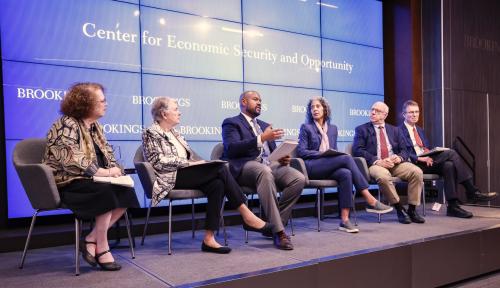Pennsylvania has two economies: one for families with middle and high incomes, and another for its low-wage families.
In the Brookings Institution’s recent report “The Price Is Wrong: Getting the Market Right for Working Families in Philadelphia,” these two economies are analyzed for the Philadelphia area, home to many of the commonwealth’s low-income households. It turns out that low-wage families pay more than other households for nearly every basic necessity.
In the economy that sells goods and services to low-income families, the average grocery store is two or three times smaller than the typical store where wealthier families buy food, which translates into a daily premium tacked on to food prices in these neighborhoods. Rent-to-own stores, used almost exclusively by low-income households, charge 90 percent of a product’s value in extra interest charges, on average. The use of check-cashing shops can cost a low-wage family hundreds of dollars in extra fees every year. And, even though the state is one of a dozen that haven’t legalized payday lending, short-term lenders in Pennsylvania are currently allowed to charge 400 to 500 percent in annual percentage rates for two-week loans.
In total, the economy for low-wage families charges thousands of dollars in higher prices that are not charged to the families that buy the same necessities in Pennsylvania’s other economy.
These higher prices hold serious consequences for families and the state.
Recent news that Pennsylvania has one of the highest foreclosure rates in the country is really just one indicator among many that financial insecurity is high in the state.
Over the last decade, Pennsylvania’s bankruptcy rate jumped by more than 200 percent. During that same time, delinquencies on mortgage payments in the state increased by 67 percent, and the proportion of past-due loans increased by 25 percent.
These trends drain money from families, limiting investments in education, children, housing, and retirement. This, in turn, keeps the state from moving ahead. Business start-up rates in the state are consistently among the lowest in the country, as is employment growth. And Pennsylvania can’t attract new, high-road economy jobs when only one of every four adults 25 years or older has a college degree.
Certainly, part of what’s needed to reverse these trends is a commitment to a broad, traditional agenda that expands access among low-income families to well-paying jobs. But higher wages spent in a parasitic economy will not help families or the state get ahead.
To move forward, state and local leaders must also move more of Pennsylvania’s low-wage families into the state’s mainstream economy.
How to do this?
The first step is to get real about this problem. Some of these higher prices are not going to go away easily. Businesses often face higher risks—such as higher delinquencies—when they sell necessities to low-wage families, charging higher prices to compensate.
But some of this risk is falsely perceived by businesses. Many supermarkets, for instance, are not in urban, low-income neighborhoods because of misleading data that suggest low incomes mean low revenues. In fact, a large number of studies now show that the high density in these urban neighborhoods can produce even greater demand than the low-density suburbs now saturated with supermarkets.
Closing loopholes that allow the worst aspects of the marketplace to take advantage of low-income families also will lower prices. The state banking secretary already has started working on the sub-prime mortgage market. The next step should be the short-term loan industry that serves mainly low-income households.
Pennsylvania’s low-income families also need a financial education that addresses new market realities. How many families, for instance, know how to boost their credit scores? Or that these scores are now factored into prices for auto and home loans, auto and home insurance, and utility setup costs?
These opportunities are just a handful of the many ways that state and local leaders can lower prices.
By bringing more Pennsylvania families into its mainstream economy, the state will grow the best of its economy and give its families the resources they need to get ahead.



Commentary
Op-edPennsylvania Can’t Afford 2 Economies
April 8, 2005